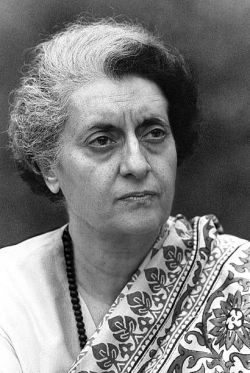Indira Gandhi: Difference between revisions
No edit summary |
No edit summary |
||
| (3 intermediate revisions by the same user not shown) | |||
| Line 1: | Line 1: | ||
{{#seo: | {{#seo: | ||
|title=Indira Gandhi – First Woman Prime Minister | |title=Indira Gandhi Biography – India’s First Woman Prime Minister & Iron Lady | ||
|description=Indira Gandhi was the first and only female Prime Minister of India, known for her strong leadership, the Emergency | |description=Indira Gandhi was the first and only female Prime Minister of India, known for her strong leadership, Emergency period, and the 1971 Bangladesh Liberation War. | ||
|image=Indira Gandhi.jpg | |keywords=Indira Gandhi, First woman Prime Minister of India, Indian National Congress, Emergency, 1971 war, Iron Lady of India, Nehru family, Indian politics | ||
| | |image=https://knowlepedia.org/images/Indira Gandhi.jpg | ||
}} | |og:type=article | ||
{{Infobox deceased | |og:title=Indira Gandhi Biography – India’s Iron Lady & Former Prime Minister | ||
|og:description=Explore the life and legacy of Indira Gandhi – from Nehru's daughter to India's most powerful woman leader. Emergency, 1971 victory, and more. | |||
|og:image=https://knowlepedia.org/images/Indira Gandhi.jpg | |||
|twitter:card=summary_large_image | |||
}} {{Infobox deceased | |||
| name = Indira Gandhi | | name = Indira Gandhi | ||
| image = Indira Gandhi.jpg | | image = Indira Gandhi.jpg | ||
| image_caption = Indira Gandhi in 1966 | | image_caption = Indira Gandhi in 1966 | ||
| birth_date = {{Birth date|1917|11|19}} | | birth_date = {{Birth date|1917|11|19}} | ||
| birth_place = | | birth_place = Allahabad, United Provinces, [[British India]] (now [[Uttar Pradesh]], India) | ||
| death_date = {{Death date and age|1984|10|31|1917|11|19}} | | death_date = {{Death date and age|1984|10|31|1917|11|19}} | ||
| death_place = [[New Delhi]], [[India]] | | death_place = [[New Delhi]], [[India]] | ||
| resting_place = | | resting_place = Shakti Sthal, New Delhi | ||
| nationality = Indian | | nationality = Indian | ||
| occupation = Politician, Prime Minister of India | | occupation = Politician, Prime Minister of India | ||
| years_active = 1947–1984 | | years_active = 1947–1984 | ||
| known_for = First woman Prime Minister of India, [[Emergency (India)]], | | known_for = First woman Prime Minister of India, [[Emergency (India)]], Green Revolution in India | ||
| awards = [[Bharat Ratna]] (1971), | | awards = [[Bharat Ratna]] (1971), Lenin Peace Prize (1983) | ||
| spouse = | | spouse = Feroze Gandhi | ||
| children = | | children = Rajiv Gandhi, Sanjay Gandhi | ||
| parents = [[Jawaharlal Nehru]] (father), Kamala Nehru (mother) | | parents = [[Jawaharlal Nehru]] (father), | ||
Kamala Nehru (mother) | |||
| religion = [[Hinduism]] | | religion = [[Hinduism]] | ||
| age_at_death = 66 | | age_at_death = 66 | ||
| website = <!-- No official website --> | | website = <!-- No official website --> | ||
| notable_works = Leadership in 1971 Indo-Pak War, Emergency (1975–77), Operation Blue Star | | notable_works = Leadership in 1971 Indo-Pak War, Emergency (1975–77), Operation Blue Star | ||
}} | }}'''Indira Priyadarshini Gandhi''' (19 November 1917 – 31 October 1984) was the first and, to date, the only female Prime Minister of India. She served as the head of government for three consecutive terms from 1966 to 1977 and a fourth term from 1980 until her assassination in 1984. She was known for her centralizing policies, decisive leadership, and controversial use of emergency powers. | ||
'''Indira Priyadarshini Gandhi''' (19 November 1917 – 31 October 1984) was the first and, to date, the only female Prime Minister of India. She served as the head of government for three consecutive terms from 1966 to 1977 and a fourth term from 1980 until her assassination in 1984. | |||
== Early Life and Education == | == Early Life and Education == | ||
Indira Gandhi was born in Allahabad to Jawaharlal Nehru, India's first Prime Minister, and Kamala Nehru. She studied at Visva-Bharati University in India, and later at Somerville College, Oxford in the UK. | Indira Gandhi was born in Allahabad to Jawaharlal Nehru, India's first Prime Minister, and Kamala Nehru. She studied at Visva-Bharati University in India, and later at Somerville College, Oxford in the UK. | ||
== Entry into Politics == | == Entry into Politics == | ||
After India's independence in 1947, she assisted her father in his official duties. She became the President of the Indian National Congress in 1959 and was appointed Minister of Information and Broadcasting under Prime Minister Lal Bahadur Shastri. | After India's independence in 1947, she assisted her father in his official duties. She became the President of the Indian National Congress in 1959 and was appointed Minister of Information and Broadcasting under Prime Minister Lal Bahadur Shastri. | ||
== Prime Ministership == | == Prime Ministership == | ||
She became Prime Minister in 1966 following Shastri’s sudden death. Her major initiatives included: | She became Prime Minister in 1966 following Shastri’s sudden death. Her major initiatives included: | ||
• Nationalization of banks and coal mines | |||
• Promotion of the Green Revolution in India, improving agricultural productivity | |||
• Leading India to victory in the Indo-Pakistani War of 1971, resulting in the creation of Bangladesh | |||
== The Emergency (1975–77) == | == The Emergency (1975–77) == | ||
Facing internal unrest and a court verdict invalidating her 1971 election, Indira Gandhi declared a national Emergency in 1975. Civil liberties were curtailed, political opposition was jailed, and press censorship was imposed. | Facing internal unrest and a court verdict invalidating her 1971 election, Indira Gandhi declared a national Emergency in 1975. Civil liberties were curtailed, political opposition was jailed, and press censorship was imposed. This period remains one of the most debated aspects of her legacy. | ||
== Return and Assassination == | == Return and Assassination == | ||
She returned to power in 1980. In 1984, Operation Blue Star was ordered to remove militants from the Golden Temple in Amritsar, which led to criticism among Sikh communities. On 31 October 1984, she was assassinated by her Sikh bodyguards in retaliation. | She returned to power in 1980. In 1984, Operation Blue Star was ordered to remove militants from the Golden Temple in Amritsar, which led to criticism among Sikh communities. On 31 October 1984, she was assassinated by her Sikh bodyguards in retaliation. | ||
== Legacy == | == Legacy == | ||
| Line 53: | Line 58: | ||
== See Also == | == See Also == | ||
• [[Jawaharlal Nehru]] | |||
• Rajiv Gandhi | |||
• [[Emergency (India)]] | |||
• Green Revolution | |||
• [[Indian National Congress|<nowiki>[[Indian National Congress]]</nowiki>]] | |||
== References == | == References == | ||
<references /> | <references /> | ||
[[Category:Articles needing expansion]] | |||
[[Category:Articles needing more references]] | |||
[[Category:1917 births]] | |||
[[Category:1984 deaths]] | |||
[[Category:Prime Ministers of India]] | |||
[[Category:Women Prime Ministers of India]] | |||
[[Category:Indian National Congress politicians]] | |||
[[Category:People from Allahabad]] | |||
[[Category:Indian politicians]] | |||
Latest revision as of 10:06, 5 August 2025
| Indira Gandhi | |
|---|---|

| |
| Indira Gandhi in 1966 | |
| Born | 19 November 1917 |
| Birthplace | Allahabad, United Provinces, British India (now Uttar Pradesh, India) |
| Died | 31 October 1984 (aged 66) |
| Place of death | New Delhi, India |
| Resting place | Shakti Sthal, New Delhi |
| Nationality | Indian |
| Occupation | Politician, Prime Minister of India |
| Years active | 1947–1984 |
| Known for | First woman Prime Minister of India, Emergency (India), Green Revolution in India |
| Notable works | Leadership in 1971 Indo-Pak War, Emergency (1975–77), Operation Blue Star |
| Awards | Bharat Ratna (1971), Lenin Peace Prize (1983) |
| Spouse(s) | Feroze Gandhi |
| Children | Rajiv Gandhi, Sanjay Gandhi |
| Parents | Jawaharlal Nehru (father),
Kamala Nehru (mother) |
| Religion | Hinduism |
| Website | |
Indira Priyadarshini Gandhi (19 November 1917 – 31 October 1984) was the first and, to date, the only female Prime Minister of India. She served as the head of government for three consecutive terms from 1966 to 1977 and a fourth term from 1980 until her assassination in 1984. She was known for her centralizing policies, decisive leadership, and controversial use of emergency powers.
Early Life and Education
Indira Gandhi was born in Allahabad to Jawaharlal Nehru, India's first Prime Minister, and Kamala Nehru. She studied at Visva-Bharati University in India, and later at Somerville College, Oxford in the UK.
Entry into Politics
After India's independence in 1947, she assisted her father in his official duties. She became the President of the Indian National Congress in 1959 and was appointed Minister of Information and Broadcasting under Prime Minister Lal Bahadur Shastri.
Prime Ministership
She became Prime Minister in 1966 following Shastri’s sudden death. Her major initiatives included:
• Nationalization of banks and coal mines
• Promotion of the Green Revolution in India, improving agricultural productivity
• Leading India to victory in the Indo-Pakistani War of 1971, resulting in the creation of Bangladesh
The Emergency (1975–77)
Facing internal unrest and a court verdict invalidating her 1971 election, Indira Gandhi declared a national Emergency in 1975. Civil liberties were curtailed, political opposition was jailed, and press censorship was imposed. This period remains one of the most debated aspects of her legacy.
Return and Assassination
She returned to power in 1980. In 1984, Operation Blue Star was ordered to remove militants from the Golden Temple in Amritsar, which led to criticism among Sikh communities. On 31 October 1984, she was assassinated by her Sikh bodyguards in retaliation.
Legacy
Indira Gandhi remains a polarizing figure—praised for her bold leadership and criticized for authoritarian tendencies. Her legacy is closely tied to the empowerment of women in politics and India’s geopolitical strength during the Cold War era.
See Also
• Rajiv Gandhi
• Green Revolution
• [[Indian National Congress]]

